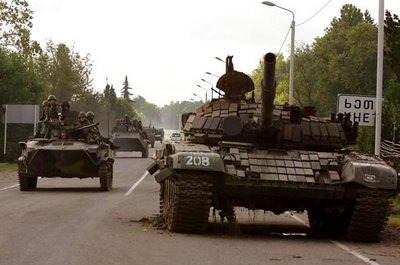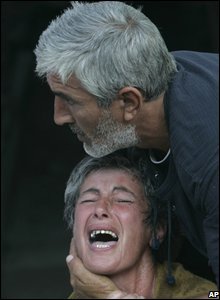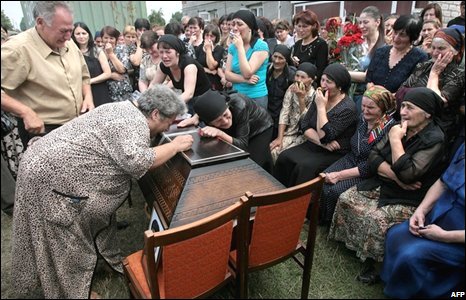The current state of affairs.
 The cliché is that crises seem to develop and take place in slow motion. When it comes to the continuing Russian occupation of Georgian territory outside of South Ossetia and Abkhazia, it's been anything but. Predictions of what was to come have been shown to be wrong in record time: Georgia's chances of joining Nato were said to be dead and buried after Saakashvili's murderous, hot-headed gambit, something proved demonstratively false by the meeting of Nato which looks set to accelerate the process. Additionally, no one thought that South Ossetia and Abkahzia would have their independence or, rather their absorption into Russia declared so quickly, something which President Medvedev started the process of at the beginning of the week, quite possibly in response to the Nato declaration, if not in so many words.
The cliché is that crises seem to develop and take place in slow motion. When it comes to the continuing Russian occupation of Georgian territory outside of South Ossetia and Abkhazia, it's been anything but. Predictions of what was to come have been shown to be wrong in record time: Georgia's chances of joining Nato were said to be dead and buried after Saakashvili's murderous, hot-headed gambit, something proved demonstratively false by the meeting of Nato which looks set to accelerate the process. Additionally, no one thought that South Ossetia and Abkahzia would have their independence or, rather their absorption into Russia declared so quickly, something which President Medvedev started the process of at the beginning of the week, quite possibly in response to the Nato declaration, if not in so many words.It is therefore probably foolish to make predictions about what is still yet to come, but that's never stopped anyone before. Firstly, for all the talk that this shows Russia awakening from a slumber, or that this means an end to the unipolar world dominated by the United States since the collapse of the Soviet Union, Russia still remains fundamentally weak, if not even further weakened by the war in a far off place of which we know little. Few in Russia probably expected the vehemence of the response from the West over Georgia, especially considering that beyond a shadow of a doubt it was the Georgian assault on South Ossetia, involving up to 300 gun barrels which started the brief but brutal conflict. This does not even begin to excuse the wholly disproportionate response from Russia, which still continues with the presence at Poti and outside of the breakaway regions, but it does mitigate against complete condemnation.
Indeed, what has occurred so far has been a further hugging from the West of the likes of Ukraine and Poland ever tighter, as shown by Miliband's mostly decent but at times breathtakingly disingenuous speech in the former country. As the Guardian leader noted, Nato has been expanding its role concerning energy security in the region. To believe that Nato does not have a sphere of influence and that its expansion is simply an expression of individual democracies exercising their sovereignty is absurd. Equally absurd is the idea that Russia's next move might be to annexe the Crimea, where again allegedly the country has been distributing passports. For all the hype over the Orange Revolution, Ukraine remains bitterly divided, and might still yet opt for the pro-Russian Yanukovych over Yushchenko, such has been the in-fighting and incompetence of the pro-Western parties.
The one trump card which Russia still holds is its stranglehold over Europe's energy supplies. Germany's policy towards Russia is almost certainly blunted directly because of its reliance on Russian gas. Even this though is in danger of being broken almost directly because of the conflict in Georgia; the Russian economy is increasingly reliant on these very same exports, and as Nosemonkey points out, even if Russia was to cut off supplies, something which simply isn't going to happen, the West would recover. Russia, on the other hand, would continue to die a slow death. For the moment we need each other much more than anyone is willing to admit - and this mitigates against any further action in western Europe.
Increasingly, the precedent for the Russian action and the swift declaration of independence in SO and Abkhazia is Kosovo. It's not a direct parallel because SO and Abk are quite obviously going to be absorbed into Russia proper, rather than become independent statelets like Kosovo, but the declaration of independence for the region at the beginning of this year is both the catalyst and will be used as the justification. For those of us without restive provinces, and despite the Troubles and current disagreements in Northern Ireland over policing, ours no longer really cut the mustard, this was a no-brainer; for Spain, however, still racked by secessionists in both the Basque and Catalan regions, it was also a no-brainer, with them refusing unlike much of the rest of Europe to recognise the new territory. Georgia, too, recognized the potential for where it could lead, with Saakashvili calling the decision hasty. Putin, however, couldn't have predicted the future any better, quite possibly because he knew what may be to come: "undoubtedly, it may entail a whole chain of unpredictable consequences to other regions in the world" that will come back to hit the West "in the face".
For the most part then, for all the changes, much has stayed the same. To believe that this will in any way prevent the US or the US and ourselves from stepping in more or less anywhere outside of Eurasia should there be even the inkling of a "threat" would be naive. With the insurgency apparently stepping up in Somalia, it probably won't be long before US strikes there against "al-Qaida" targets are once again in the news, in a war which is in effect being waged via the Ethiopian occupation, and it's doubtful that even Obama's election would change that. Russia still remains the same paranoid country that it has been since the beginning of the 90s, increasingly encircled but only occasionally striking out in battles that it knows it can win in its own highly diluted "sphere of influence", whether it be Chechnya or now the breakaway provinces of Georgia. Unhelpful and becoming too prominent figures such as Litvinenko and Anna Politkovskaya will continue to be rubbed out. The question has to be whether confrontation is worth it over this issues, and fundamentally, the answer is no. The current path however is that exact confrontation, and in the meantime the wholesale demonisation of Russia beyond that which it deserves will likely continue apace.
Labels: Abkhazia, foreign policy, Georgia, hypocrisy, Kosovo, Mikheil Saakashvili, propaganda, Russia, Russia-Georgia war, South Ossetia, status quo, Vladimir Putin




